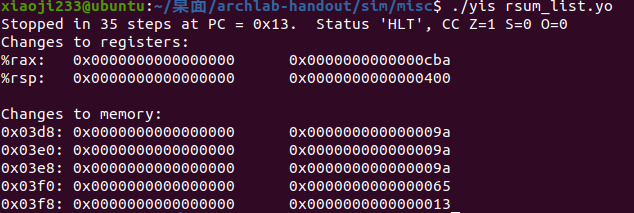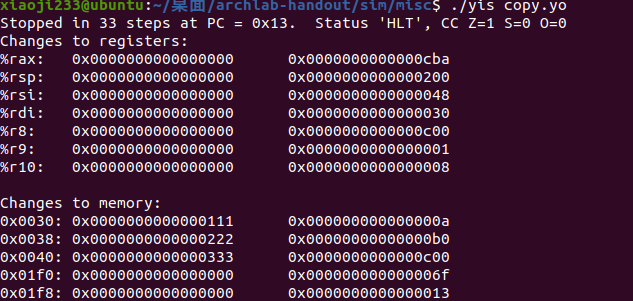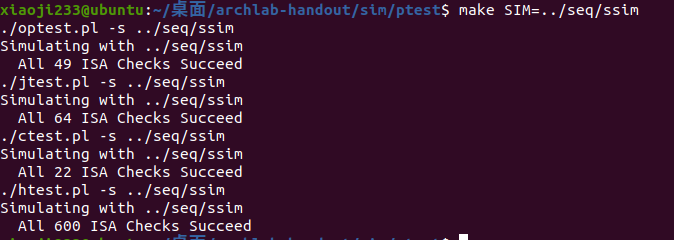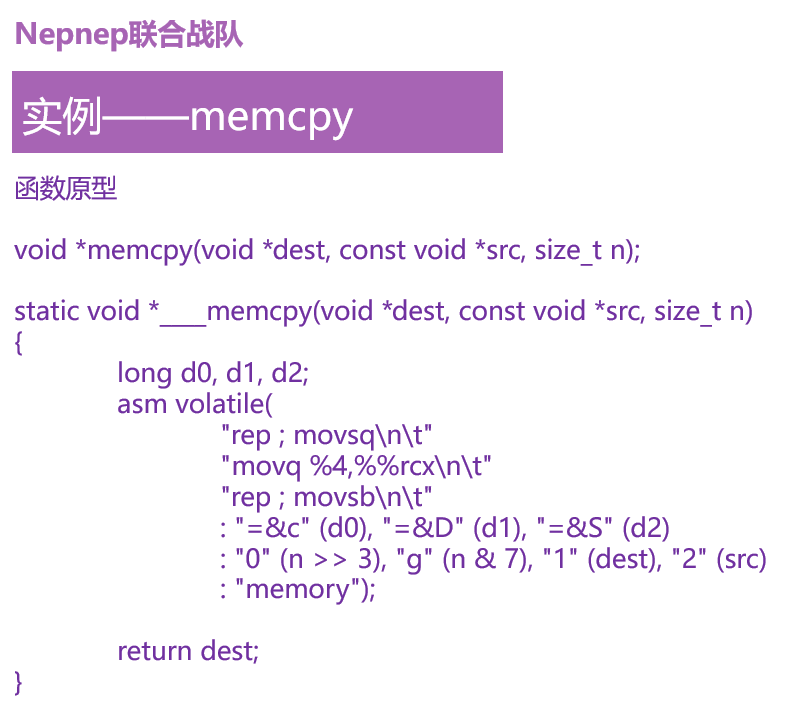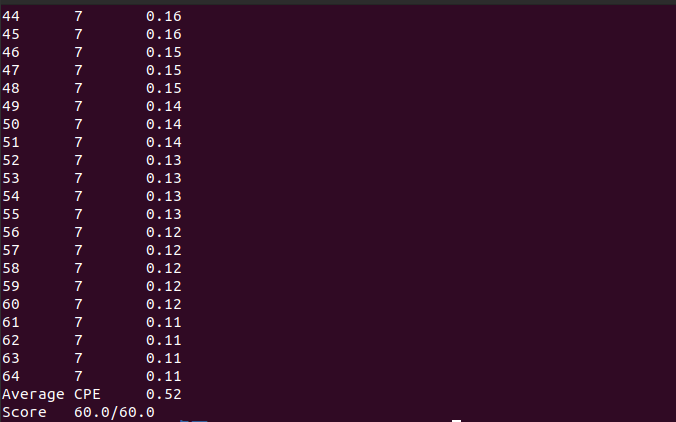1
2
3
4
5
6
7
8
9
10
11
12
13
14
15
16
17
18
19
20
21
22
23
24
25
26
27
28
29
30
31
32
33
34
35
36
37
38
39
40
41
42
43
44
45
46
47
48
49
50
51
52
53
54
55
56
57
58
59
60
61
62
63
64
65
66
67
68
69
70
71
72
73
74
75
76
77
78
79
80
81
82
83
84
85
86
87
88
89
90
91
92
93
94
95
96
97
98
99
100
101
102
103
104
105
106
107
108
109
110
111
112
113
114
115
116
117
118
119
120
121
122
123
124
125
126
127
128
129
130
131
132
133
134
135
136
137
138
139
140
141
142
143
144
145
146
147
148
149
150
151
152
153
154
155
156
157
158
159
160
161
162
163
164
165
166
167
168
169
170
171
172
173
174
175
176
177
178
179
180
181
182
183
184
185
186
187
188
189
190
191
192
193
194
195
196
197
198
199
200
201
202
203
204
205
206
207
208
209
210
211
212
213
214
215
216
217
218
219
220
221
222
223
224
| #
####################################################################
# HCL Description of Control for Single Cycle Y86-64 Processor SEQ #
# Copyright (C) Randal E. Bryant, David R. O'Hallaron, 2010 #
####################################################################
## Your task is to implement the iaddq instruction
## The file contains a declaration of the icodes
## for iaddq (IIADDQ)
## Your job is to add the rest of the logic to make it work
####################################################################
# C Include's. Don't alter these #
####################################################################
quote '#include <stdio.h>'
quote '#include "isa.h"'
quote '#include "sim.h"'
quote 'int sim_main(int argc, char *argv[]);'
quote 'word_t gen_pc(){return 0;}'
quote 'int main(int argc, char *argv[])'
quote ' {plusmode=0;return sim_main(argc,argv);}'
####################################################################
# Declarations. Do not change/remove/delete any of these #
####################################################################
##### Symbolic representation of Y86-64 Instruction Codes #############
wordsig INOP 'I_NOP'
wordsig IHALT 'I_HALT'
wordsig IRRMOVQ 'I_RRMOVQ'
wordsig IIRMOVQ 'I_IRMOVQ'
wordsig IRMMOVQ 'I_RMMOVQ'
wordsig IMRMOVQ 'I_MRMOVQ'
wordsig IOPQ 'I_ALU'
wordsig IJXX 'I_JMP'
wordsig ICALL 'I_CALL'
wordsig IRET 'I_RET'
wordsig IPUSHQ 'I_PUSHQ'
wordsig IPOPQ 'I_POPQ'
# Instruction code for iaddq instruction
wordsig IIADDQ 'I_IADDQ'
##### Symbolic represenations of Y86-64 function codes #####
wordsig FNONE 'F_NONE' # Default function code
##### Symbolic representation of Y86-64 Registers referenced explicitly #####
wordsig RRSP 'REG_RSP' # Stack Pointer
wordsig RNONE 'REG_NONE' # Special value indicating "no register"
##### ALU Functions referenced explicitly #####
wordsig ALUADD 'A_ADD' # ALU should add its arguments
##### Possible instruction status values #####
wordsig SAOK 'STAT_AOK' # Normal execution
wordsig SADR 'STAT_ADR' # Invalid memory address
wordsig SINS 'STAT_INS' # Invalid instruction
wordsig SHLT 'STAT_HLT' # Halt instruction encountered
##### Signals that can be referenced by control logic ####################
##### Fetch stage inputs #####
wordsig pc 'pc' # Program counter
##### Fetch stage computations #####
wordsig imem_icode 'imem_icode' # icode field from instruction memory
wordsig imem_ifun 'imem_ifun' # ifun field from instruction memory
wordsig icode 'icode' # Instruction control code
wordsig ifun 'ifun' # Instruction function
wordsig rA 'ra' # rA field from instruction
wordsig rB 'rb' # rB field from instruction
wordsig valC 'valc' # Constant from instruction
wordsig valP 'valp' # Address of following instruction
boolsig imem_error 'imem_error' # Error signal from instruction memory
boolsig instr_valid 'instr_valid' # Is fetched instruction valid?
##### Decode stage computations #####
wordsig valA 'vala' # Value from register A port
wordsig valB 'valb' # Value from register B port
##### Execute stage computations #####
wordsig valE 'vale' # Value computed by ALU
boolsig Cnd 'cond' # Branch test
##### Memory stage computations #####
wordsig valM 'valm' # Value read from memory
boolsig dmem_error 'dmem_error' # Error signal from data memory
####################################################################
# Control Signal Definitions. #
####################################################################
################ Fetch Stage ###################################
# Determine instruction code
word icode = [
imem_error: INOP;
1: imem_icode; # Default: get from instruction memory
];
# Determine instruction function
word ifun = [
imem_error: FNONE;
1: imem_ifun; # Default: get from instruction memory
];
bool instr_valid = icode in
{ INOP, IHALT, IRRMOVQ, IIRMOVQ, IRMMOVQ, IMRMOVQ,
IOPQ, IJXX, ICALL, IRET, IPUSHQ, IPOPQ, IIADDQ };
# Does fetched instruction require a regid byte?
bool need_regids =
icode in { IRRMOVQ, IOPQ, IPUSHQ, IPOPQ,
IIRMOVQ, IRMMOVQ, IMRMOVQ, IIADDQ };
# Does fetched instruction require a constant word?
bool need_valC =
icode in { IIRMOVQ, IRMMOVQ, IMRMOVQ, IJXX, ICALL, IIADDQ };
################ Decode Stage ###################################
## What register should be used as the A source?
word srcA = [
icode in { IRRMOVQ, IRMMOVQ, IOPQ, IPUSHQ } : rA;
icode in { IPOPQ, IRET } : RRSP;
1 : RNONE; # Don't need register
];
## What register should be used as the B source?
word srcB = [
icode in { IOPQ, IRMMOVQ, IMRMOVQ, IIADDQ } : rB;
icode in { IPUSHQ, IPOPQ, ICALL, IRET } : RRSP;
1 : RNONE; # Don't need register
];
## What register should be used as the E destination?
word dstE = [
icode in { IRRMOVQ } && Cnd : rB;
icode in { IIRMOVQ, IOPQ, IIADDQ} : rB;
icode in { IPUSHQ, IPOPQ, ICALL, IRET } : RRSP;
1 : RNONE; # Don't write any register
];
## What register should be used as the M destination?
word dstM = [
icode in { IMRMOVQ, IPOPQ } : rA;
1 : RNONE; # Don't write any register
];
################ Execute Stage ###################################
## Select input A to ALU
word aluA = [
icode in { IRRMOVQ, IOPQ } : valA;
icode in { IIRMOVQ, IRMMOVQ, IMRMOVQ, IIADDQ } : valC;
icode in { ICALL, IPUSHQ } : -8;
icode in { IRET, IPOPQ } : 8;
# Other instructions don't need ALU
];
## Select input B to ALU
word aluB = [
icode in { IRMMOVQ, IMRMOVQ, IOPQ, ICALL,
IPUSHQ, IRET, IPOPQ, IIADDQ } : valB;
icode in { IRRMOVQ, IIRMOVQ } : 0;
# Other instructions don't need ALU
];
## Set the ALU function
word alufun = [
icode == IOPQ : ifun;
1 : ALUADD;
];
## Should the condition codes be updated?
+bool set_cc = icode in { IOPQ, IIADDQ };
################ Memory Stage ###################################
## Set read control signal
bool mem_read = icode in { IMRMOVQ, IPOPQ, IRET };
## Set write control signal
bool mem_write = icode in { IRMMOVQ, IPUSHQ, ICALL };
## Select memory address
word mem_addr = [
icode in { IRMMOVQ, IPUSHQ, ICALL, IMRMOVQ } : valE;
icode in { IPOPQ, IRET } : valA;
# Other instructions don't need address
];
## Select memory input data
word mem_data = [
# Value from register
icode in { IRMMOVQ, IPUSHQ } : valA;
# Return PC
icode == ICALL : valP;
# Default: Don't write anything
];
## Determine instruction status
word Stat = [
imem_error || dmem_error : SADR;
!instr_valid: SINS;
icode == IHALT : SHLT;
1 : SAOK;
];
################ Program Counter Update ############################
## What address should instruction be fetched at
word new_pc = [
# Call. Use instruction constant
icode == ICALL : valC;
# Taken branch. Use instruction constant
icode == IJXX && Cnd : valC;
# Completion of RET instruction. Use value from stack
icode == IRET : valM;
# Default: Use incremented PC
1 : valP;
];
#
|

